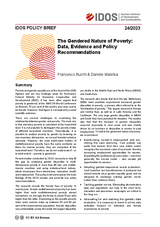Policy Brief
The gendered nature of poverty: data, evidence and policy recommendations
Burchi, Francesco / Daniele MalerbaPolicy Brief (24/2023)
Bonn: German Institute of Development and Sustainability (IDOS)
DOI: https://doi.org/10.23661/ipb24.2023.v2.0
2nd, revised edition
The 1st edition is no longer available.
Poverty and gender equality are at the heart of the 2030 Agenda and are key strategic areas for Germany’s Federal Ministry for Economic Cooperation and Development (BMZ). It has been often argued that poverty is gendered: at the 1995 UN World Conference on Women, 70 per cent of the world’s poor was said to be female. However, that figure is not backed by sound scientific evidence. There are several challenges to examining the relationship between gender and poverty. The main one is that monetary poverty is calculated at the household level: it is not possible to distinguish the poverty status of different household members. Theoretically, it is possible to analyse poverty by gender by focusing on non-monetary dimensions, as several feminist scholars advocate. However, the most well-known indices of multidimensional poverty have the same problems as those for income poverty: they are computed at the household level. Therefore, we do not really know if – or to what extent – poverty is gendered. Recent studies conducted by IDOS researchers help fill this gap by analysing gender disparities in multidimensional poverty in more than 80 low- and middle-income countries and using individual-level indices, which encompass three dimensions: education, health and employment. This policy brief summarises the main findings of the IDOS studies and presents key policy recommendations. The research reveals the female face of poverty. In recent years, female multidimensional poverty has been higher than male multidimensional poverty almost everywhere: on average, the former is about 70 per cent higher than the latter. Depending on the specific poverty index used, women make up between 54 and 63 per cent of the impoverished population. Gender disparities vary substantially across the world: the largest disparities are visible in the Middle East and North Africa (MENA) and South Asia. The research also shows that from the late 1990s/early 2000s most countries experienced increased gender disparities in poverty, a process often referred to as the “feminisation of poverty”. This largely occurred in Europe and Central Asia, as well as in Latin America and the Caribbean. The very large gender disparities in MENA and South Asia have persisted for decades. The studies also find that the increase in gender disparities occurred especially in rural areas and was mostly driven by an increase in disparities in access to paid employment. To tackle the gendered nature of poverty, we recommend:
• Incentivising women’s employment and pro-moting the care economy. Care policies can partly free women from their care duties and/or recognise the economic value of care work, thereby increasing employment opportunities for women. Expanding the (professional) care sector – and more generally, the service sector – also creates job opportunities for women.
• Adopting gender-responsive social protection. Cash transfers can benefit women in particular but should include clear gender-equality goals and be designed to challenge existing gender norms (rather than reinforce them).
• Tackling gender norms. Eliminating discriminatory laws and regulations can help in the short term; education and awareness campaigns are critical in the long run.
• Advocating for and realising the (gender) data revolution. It is necessary to invest in ad-hoc data collection focused on individual and female experiences of poverty.
Kontakt
Cornelia Hornschild
Koordinatorin Publikationen
E-Mail Cornelia.Hornschild@idos-research.de
Telefon +49 (0)228 94927-135
Fax +49 (0)228 94927-130
Alexandra Fante
Bibliothekarin/Open Access-Koordinatorin
E-Mail Alexandra.Fante@idos-research.de
Telefon +49 (0)228 94927-321
Fax +49 (0)228 94927-130





